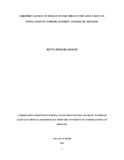| dc.contributor.author | Koech, Betty J | |
| dc.date.accessioned | 2015-12-07T07:37:43Z | |
| dc.date.available | 2015-12-07T07:37:43Z | |
| dc.date.issued | 2015 | |
| dc.identifier.uri | http://hdl.handle.net/11295/92993 | |
| dc.description.abstract | Background: - Dengue virus (DENV) is a mosquito-borne pathogen causing Dengue fever (DF) and dengue haemorrhagic fever (DHF). It is spread by the Aedes mosquitoes which are container breeders and live in close proximity to humans. This is an important factor as these mosquitoes therefore spread this disease with ease especially in the populated urban areas. DENV is the most rapidly spreading mosquito borne viral disease in the world causing an estimated 50–100 million DENV infections and hundreds of thousands of cases of DHF/DSS annually, with children bearing much of the disease burden.
Broad objectives: - To determine Dengue fever hotspots in selected regions in Kenya.
Study method
This was a cross-sectional descriptive study. Permission to do the study was sought from KNH-UoN Ethical review committee and Kenya National Blood Transfusion Services after which blood samples were collected from consenting adults donating blood at the regional blood transfusion centres in Nairobi, Eldoret and Kisumu. Plasma was then screened for anti-dengue virus IgG antibodies using Dengue DxSelect™ IgG in-house ELISA, giving the prevalence. The data was analysed using SPSS.
Results: - A total of 490 study participants were randomly sampled during the blood donation exercise in Kisumu, Eldoret and Nairobi: 61 (16%) were female and 326 (82%) were male. They then underwent a standardized interview and were blood sampled. The median age was 25 years with the youngest participant being 18 and the oldest 64 years. 387 plasma samples were tested for anti-dengue IgG antibodies. From Nairobi region, 99 samples were screened for anti-dengue IgG giving a prevalence of 11.1% (11/99). From Eldoret a total of 138 samples were screened giving a prevalence of 2.2% (3/138). In Kisumu, 150 samples were screened giving a prevalence of 5.4% (8/150). The presence of dengue fever virus antibodies in the adult Kenyan population
was found to be at 5.7% (22/387).
Conclusion: - The prevalence of dengue in the adult Kenyan population in Nairobi was 11.1%, Kisumu 5.4% and Eldoret 2.2%. This therefore means that there is exposure to dengue virus and hence possibility of outbreaks in these regions where no outbreaks have ever been reported. In addition there seems to be a marked increase of dengue activity in Kisumu since the last study done in 2011 showed dengue seroprevalence was at 1.1%. Improved diagnosis and surveillance of dengue fever virus would help predict future outbreaks. | en_US |
| dc.language.iso | en | en_US |
| dc.publisher | University of Nairobi | en_US |
| dc.title | Seroprevalence of dengue fever virus in the adult Kenyan population In Nairobi, Eldoret and Kisumu Regions | en_US |
| dc.type | Thesis | en_US |
| dc.description.department | a
Department of Psychiatry, University of Nairobi, ; bDepartment of Mental Health, School of Medicine,
Moi University, Eldoret, Kenya | |

